INBOUND MARKETING FOR MANUFACTURERS
Generating leads and sales opportunities through your website.
In this day and age, business growth starts online, because that's where prospects start their journey towards selecting a manufacturing partner. Whether you target engineers, professional buyers, or CEOs, you need to be found online when they're looking.
Inbound marketing takes the myriad of web marketing tactics and puts them to work towards a common goal - lead generation. Not just any leads either... the focus is on leads that look like your best buyers.
If you want to get started making the shift to a growing, predictable sales pipeline through inbound marketing for manufacturers, you've come to the right place. This is your resource for getting started.
Contents
The Brutal Truth About Traditional Manufacturer Marketing

For years and years, small to medium sized manufacturers have been a step slow in their marketing strategies. Many don't really have a strategy all. They employ the same tactics year after year and 'hope' for better results.
Many also forgo the investment in marketing completely, writing it off as an unneeded expense. To be brutally honest, for many, that has been a wise decision, because doing marketing the wrong way IS an unneeded expense.
The handful of marketing tactics that Manufacturers tend to use include:
- Trade Shows
- Trade publications,
- Websites with one-time SEO, and
- Direct outreach (typically from a sales person).
Each of these tactics can produce results when done right. That means having a sound strategy that crosses platforms and channels. Think trade shows with social media, email nurturing, video, and CRM. Think trade publications with trackable URLs in the ad or article, and a significant push from the publication to promote your brand.
All in all, we often find that manufacturers are 5-10 years behind in the evolution of their marketing and sales approach. This is a huge risk for the manufacturers that choose to stay behind the curve, and a tremendous opportunity for those that decide to jump in feet first.
Fundamental Change In Manufacturer Buyer Behavior
How many people do you know that don't have a computer, tablet, or smartphone? My guess is you'd be hard pressed to count them on one or two fingers these days.
I won't drone on for paragraphs with all of the stats about technology and internet adoption. Even the naysayers of the late '90s and early 2000s have accepted the fact that technology is now woven into just about every aspect of our lives, and isn't going away.
This fundamental change has lead us to have access to unlimited amounts of information. Whether we want to
- learn how to fix our leaky sink,
- find the maintenance intervals for our tractor,
- determine which metals resist corrosion the best,
- understand the process for becoming ISO certified, or
- find a partner to complete a part of our manufacturing process,
it's all accessible online, instantly. This access has turned the tables on the traditional buyer-seller relationship.
These Days, The Buyer Educates the Seller
Gone are the days when buyers are forced to speak with sellers to get the information they need to make a buying decision. In fact, forcing that situation on today's manufacturing buyer will move you to the bottom of their list.
 Consider the modern dynamic of buying a car. Do you walk on the lot with no plan, hoping a car salesman will guide you to the car you want, need, and can afford? Of course not! You walk on the lot and locate the exact car you've extensively researched online, with a market price comparison for that car, competitive trade offers for your car, and a solid understanding of what packages the car has, and which it doesn't.
Consider the modern dynamic of buying a car. Do you walk on the lot with no plan, hoping a car salesman will guide you to the car you want, need, and can afford? Of course not! You walk on the lot and locate the exact car you've extensively researched online, with a market price comparison for that car, competitive trade offers for your car, and a solid understanding of what packages the car has, and which it doesn't.
When the car salesman tries to tell you that the car doesn't have an option you know it does, you can quickly rebut him. When the salesman states the city gas mileage incorrectly, you can quickly rebut him. When the salesman tells you that the price they're asking is at the bottom of the market, you can put the competitive quotes in front of him.
This scenario is true for every industry. Buying an injected molded plastic part or roll-formed metal part works the exact same way. Buyers have an enormous amount of information when they come to the table.
The role of inbound marketing for manufacturers is to be that source of information. Be in the search results when someone Googles a problem you can solve. Be in social media when they are searching for opinions and references. Be in their inbox when they come back to the problem you can solve. Be available for a more formal discussion, when they are ready to finally talk.
Inbound Marketing For Manufacturers - The Foundation for Success
It's very tempting to jump right into tactics like blogging, email marketing, and social media without a plan. They are all very accessible and easy to setup. The problem is, they don't work real well in silos. You need a cohesive strategy that uses these tactics to drive leads.
Speaking of leads... which of your customers would you love to clone? Those are the types of website visitors we want to drive to your website and turn into
leads. To do that, we need to fully understand what makes them tick.
Buyer Persona - Not the Target Market of Old.
You've surely heard the phrase “target market” before, so you may be wondering, aren't buyer personas just target markets?
Nope. Buyer personas go waaaay deeper than that. You can start with your target markets when you create your personas, but you’ll soon find that your personas can span multiple markets, or you’ll have multiple personas within one market.
Buyer personas are also more stable than a target market. Because personas are based on goals and behaviors, they are unlikely to shift with technology or need to be updated constantly.
A buyer persona is a multi-dimensional, high-definition, fictional human being who represents the interests of your best buyers.
Buyer personas are ARCHETYPES - a general representation of a group of individuals, without the defining characteristics of those individual people. Personas give insight into the buyer’s needs, goals, and motivations. If you understand what drives your customers, you will be that much more successful.
What goes into a buyer persona?
Here’s a list of some information a Buyer Persona reveals:
- Age
- Family (married, single, divorced, children, grandchildren)
- Education level
- Job title/role
- How their performance is measured
- What a day in their life is like (from waking up to bed time)
- Responsibilities
- What success looks like to them
- Their biggest challenges and how they overcome them
- Industry or industries served by their company
- Size of their company (employees or sales)
- How do they get better at their job (training)
- What they read regularly
- What social networks and associations they belong to
- Communication preferences (email, text messages, meeting, phone call)
- Do they use the internet for research? If so, how?
This information produces a clear picture of who your Inbound Marketing efforts will attract, compared to the broad target market demographics.
Why Do Manufacturers Need Buyer Personas?
1 - They are a window into the buyer’s world and journey. Understanding your buyers makes them “real,” but getting a glimpse into their lives takes it one step further. You gain insight into what isn’t obvious, what remains un-articulated, and you’ll become familiar with their stories and voices (which you then mirror back to them in your content).
2 - They give a direction to everything you do. Your manufacturer marketing strategies should mold to the needs of your buyers. Because their needs sure as heck won’t mold to your business strategies, as great as that would be.
3 - Buyer personas will make ALL of your manufacturer marketing strategies more effective. They give insight into keywords and buying behaviors. They strengthen and hone your marketing message mist into a jet stream. They minimize wasted time and capital. They are, overall, pretty damn great.
Getting Started with Your Buyer Personas
Now that you know what buyer personas are, how do you create and apply them?
Personas are built on a foundation of primary research (input directly from customers), secondary research (data available online and through your records), and the internal collaboration of your company (different departments bringing their expertise).
Primary research includes interviews, questionnaires, and surveys. Interviews will be your greatest resource in building personas.
Secondary research includes info from your CRM, sales stats, and customer data. It can also be taken from third-party resources (such as online databases, studies, and other people who interact with your buyers).
The third part of the equation is getting employees from your company together to share their knowledge and brainstorm. This is where many companies run into barriers: marketing and sales refusing to play nice, lack of internal support, and inability to make decisions being the major problems.

Finally, you get to apply them to all of your marketing and business strategies. These personas will influence
- your website,
- your content,
- your product development, and
- more.
As you gather your research, you should be able to answer the “W” questions mentioned above: who, what, when, where, why, how. For example:
- Who is buying? Who is involved in the purchasing process/journey/decision? Focus on the right people at each stage.
- What are they interested in buying? What products will best solve the problems they have? Clear answers to buyer questions.
- When are they buying? Time of day, month, year? When is your product most useful? Events that trigger buyer’s journey - when to make contact.
- Where do they go to get information about products? What sources do they trust? Events, blogs, forums, etc.
- Why are they buying? Why are they NOT buying? Knowing “why” can give you ammo against internal opposition to marketing decisions.
- How are they buying? What decisions do they make throughout the process? What affects those decisions? Tell the buyer’s story in their authentic voice.
Once you’ve got all the information and your team is on the same page, you can start fleshing out the personas. But you’re not finished once you make the personas. You still have to apply them to every aspect of your business - your website, all of your content, your marketing strategies, everything.
This is not a simple or quick process. There are a lot of mistakes you can make. To help shorten the learning curve, we've put together the Buyer Persona Guide below:
Buyer Journey - Every Engineer and Professional Buyer has a Process.
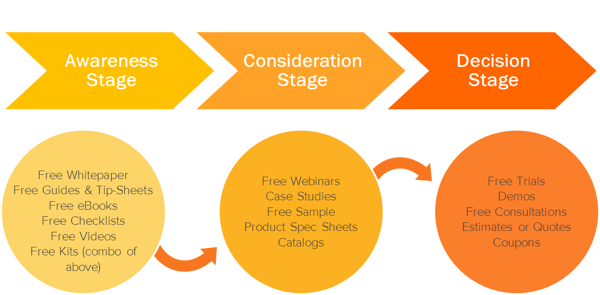
Every Buyer Persona goes through a Buyer’s Journey: the process of feeling symptoms of a problem, researching a problem, comparing possible solutions, and then making a buying decision. It's important to mention that the journey doesn't have to be about solving a problem. It can also be about seizing an opportunity.
The Buyer’s Journey is different from one industry to the next, but there are common stages they all share.
Awareness
 The Awareness stage is when your Manufacturing Buyer Persona first acknowledges that he/she has a problem and begins initial research. They may not be able to put a name to the problem at this point.
The Awareness stage is when your Manufacturing Buyer Persona first acknowledges that he/she has a problem and begins initial research. They may not be able to put a name to the problem at this point.
Example: An engineer may be tasked with designing an enclosure that will survive 4 years without corrosion. They will probably jump on Google and start to research material options, and the best way to manipulate the materials to ensure they resist corrosion and survive for 4 years.
Consideration
In the Consideration stage, your Manufacturing Buyer Persona has defined his/her problem or opportunity and is now researching options to solve the problem.
Example: The engineer has determined, based on his Consideration stage research, that he can use stainless steel with a specific alloy composition, or a more economical metal with a corrosion resistant finish. He can have the metal welded, bent, or roll formed.
Decision
When your Manufacturing Buyer Persona reaches the Decision stage, they have decided on a solution or strategy. They know roughly which approach they want to take, but need to compare a list of vendors or products before making a final decision.
Example: The engineer knows they want to use aluminum with a powder coated finish. They now need to find a manufacturer that can produce the part
- in the quantities they need,
- in the time intervals they need,
- with the quality they need,
- at a price they can afford.
Guess where they'll start looking for the manufacturing partner? You guessed it, online!
Be Their Source of Information and Get the Sale
All along the buyer's journey, your buyer is researching aspects of their problem online. You need to be the source of answers. The more they visit your site learning about their options, the more likely you are to be top of mind when they reach the decision stage. Why would you let your competitor be that resource?
Your Current Website Is Probably ALL About the Decision Stage - This is a HUGE Problem
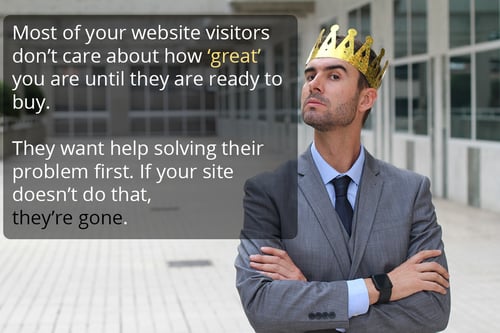 The vast majority of business websites speak directly to the Decision-stage buyer. They aren’t focused on diagnosing the buyer’s symptoms – they just want the buyer to select them as the solution. This is a HUGE problem! Remember how we discussed the fundamental change in buyer behavior above? They don't care about you until they're over half way through their buyer journey. That means your decision stage website completely misses them.
The vast majority of business websites speak directly to the Decision-stage buyer. They aren’t focused on diagnosing the buyer’s symptoms – they just want the buyer to select them as the solution. This is a HUGE problem! Remember how we discussed the fundamental change in buyer behavior above? They don't care about you until they're over half way through their buyer journey. That means your decision stage website completely misses them.
One of the best ways to appeal to the first two stages is to add regular, consistent blogging to your inbound marketing mix. Your blog should have posts that address your Buyer Personas’ problems so you can reach them earlier in the buying process.
There are advantages to connecting with your ideal buyers as early as possible in the Buyer’s Journey, including:
- Brand awareness
- Establishing trust early on
- Establishing yourself as an expert
- Setting the buying criteria
- Directing their next action
The bottom line is, you have to understand your buyer's journey, and what they need at each stage. Be there with great content, and you're on your way to generating a predictable sales pipeline.
The Inbound Marketing Methodology for Manufacturers
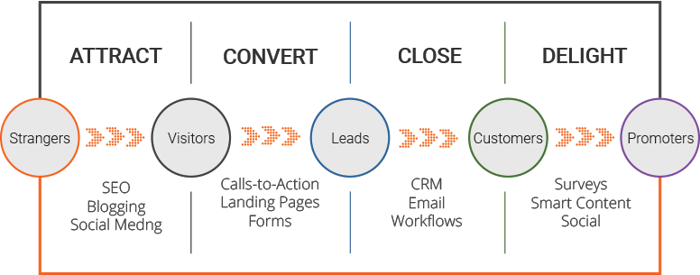 Inbound marketing for manufacturers takes all of the web tactics you've heard about and maybe even tried, and puts them to work together, in one strategy. Instead of trying to use Twitter, or MailChimp, or a Blog, or Google Adwords for a week and getting frustrated by the lack of results, Inbound Marketing focuses these tactics around a core strategy of Attracting the right people to your website and blog, converting those people into leads, nurturing those leads, closing the leads into sales, and adding value after the sale, delivering customer delight.
Inbound marketing for manufacturers takes all of the web tactics you've heard about and maybe even tried, and puts them to work together, in one strategy. Instead of trying to use Twitter, or MailChimp, or a Blog, or Google Adwords for a week and getting frustrated by the lack of results, Inbound Marketing focuses these tactics around a core strategy of Attracting the right people to your website and blog, converting those people into leads, nurturing those leads, closing the leads into sales, and adding value after the sale, delivering customer delight.
Because inbound marketing is methodical with a bit of art, and a bit of science, manufacturers tend to relate well to the methodology. Let's dissect the elements of the inbound marketing methodology for manufacturers.
Attract Manufacturing Buyers to Your Website
 Remember the buyer personas we established above? That's who we need to attract to your website. We want to steadily increase the volume of high-value visits.
Remember the buyer personas we established above? That's who we need to attract to your website. We want to steadily increase the volume of high-value visits.
Getting more eyes on your website requires a steady diet of
- content creation (blogs, videos, ebooks, etc...) geared towards your persona's buyer journey stages,
- search engine optimization,
- social media content sharing (your's and others'),
- email marketing, and sometimes
- pay-per-click advertising.
Attracting more manufacturing buyers to your website is all about being where your persona is looking, when they're in their buyer's journey.Think back to the examples above in the Buyer Journey section.
Example of How the Attract Component Works:
 When the engineer from above was in his Awareness stage, he was researching metal characteristics that resist corrosion, and processes that can be used on the metal. He had a very baseline understanding of what his problem was. If you were to produce blog content such as:
When the engineer from above was in his Awareness stage, he was researching metal characteristics that resist corrosion, and processes that can be used on the metal. He had a very baseline understanding of what his problem was. If you were to produce blog content such as:
- The Most Cost-Effective Corrosion Inhibitor for Aluminum,
- 5 Reasons Stainless Steel Outlasts Aluminum,
- The 3 Best Metal Finishes to Stave Off Corrosion,
- How Roll Forming Compares to Welded Parts
you would be well on your way to ranking in search engines for some of the keywords the engineer would use when starting his buying process. Sharing these and similar content in social channels will ensure that you can get found in more than just search engines.
This means you're establishing a connection with a potential buyer early on in their research. You now have the opportunity to turn this prospect into a lead.
Convert Website Visitors Into Leads

While it all starts with Attracting high quality visitors to your website, inbound marketing is truly about optimizing your site to convert them into leads. This means having a clear path already laid out so they can just follow your breadcrumbs and skip happily along towards conversion.
With inbound marketing for manufacturers, we generate leads with high value content that helps the visitor to further research their problem. This premium content could be in the form of a webinar, eBook, tip sheet, case study, catalog, or video. In exchange for accessing this content, the visitor provides their name and email address. Depending on the type of premium content, you may ask for further details, like company name.
This contact for content exchange happens on a landing page that explains the value proposition of the content. The goal is to sincerely help and support the prospect through their buyer's journey. When they submit the form on the landing page, you provide them with the premium content, and now have an avenue for nurturing the lead with marketing automation.
Example of How the Convert Component Works:
When the engineer from above lands on your blog post titled, "5 Reasons Stainless Steel Outlasts Aluminum", he reads through the blog and when he reaches the end, he's presented with an option to download a guide titled, "How to Select the Right Gauge of Stainless Steel". That sounds like a reasonable next step for the engineer, so he clicks on the button (a call to action) to get the guide.
The engineer is then taken to a landing page that explains what's in the guide and why it will help him. He's presented with a form, where he enters basic contact details to gain access to the guide. Once the form is submitted, the engineer receives access to the guide, and is entered into a marketing automation program.
The engineer has just Converted into a lead.
Close Leads into REAL SALES

Inbound marketing generates valuable leads, AND allows you to nurture them through their buyer journey, into a closed sale. One of the biggest mistakes we see manufacturers make is neglecting leads that come through their website. This is especially true if the lead isn't directly requesting a quote. That's a recipe for a lost deal.
Half the battle is identifying the proper workflows to nurture and follow up with your leads. Some steps in your workflows may be personal contact, while others are automated follow-ups with email marketing or social media. Regardless of how you want to do it, it's vital that sales and marketing work together to establish a standard operating procedure of how leads are nurtured.
A nurtured lead is much easier close. The great thing about the whole process is that you're closing your buyer persona (best buyers). We all want more of our best buyers.
Example of How the Close Component Works:

After our engineer from above enters his contact details in exchange for the free guide, he's now your lead. His contact details find their way into your CRM and marketing automation platform (hopefully automatically), and he is ready to be nurtured.
Nurturing our engineer can take many shapes and forms, depending on what the engineer decided to download. In the example above, he downloaded a guide called '5 Reasons Stainless Steel Outlasts Aluminum'. This guide is categorized as a consideration stage guide, so we're going to nurture him towards his decision stage.
We're going to:
- Send him an immediate follow up email with a link to his guide, and possibly a related resource on our blog.
- Wait 1 day
- Send him another email asking him if he had a chance to read the guide, and if he has any questions.
- Wait 2 days
- If he hasn't responded, try to connect with him on LinkedIn, referencing the guide again
- Send him another email with a case study of someone that chose aluminum vs stainless and how it impacted cost and longevity
- Wait 2 days
- If he hasn't responded in any way, send him a 'break up' email. Let him know that you understand that he might not be ready to chat, and that you'll stop emailing him.
- Chances are, he'll email back, but if not, set a task to check in on his engagement with your website in 1 week intervals
- Over time, you may decide to pick up the phone - and that's fine.
- Eventually, you will start your sales process and turn this lead into a sale.
All of these steps (save manually connecting on LinkedIn) can be automated with a marketing automation platform like HubSpot. It's important to understand that these steps would be different if the engineer downloaded another premium or submitted a RFQ.
Delight Customers Into Raving, Referring Fans
 A referred opportunity is the easiest sale to close. Why? Because trust is implied from the beginning. Delighted customers will not only refer you to others, but they also tend to buy again, and again, and again.
A referred opportunity is the easiest sale to close. Why? Because trust is implied from the beginning. Delighted customers will not only refer you to others, but they also tend to buy again, and again, and again.
However, this doesn't happen if you don't deliberately bring delight to your customers after the sale. Aside from completely delivering on what the customer hired you to do, you can go above and beyond to provide help and support after the sale, for other pain points they may experience.
Example of How the Delight Component Works:
After our engineer from above becomes a customer, you deliver his corrosion-resistant part on time, with no quality issues. All in all, the order was a success.
We want our engineer friend to be truly delighted with our company, to the point where he becomes a repeat buyer, referring his colleagues, and promoting us at will! This means more than just doing what he paid us to do. We need to extend our support of him beyond the final invoice payment.
To truly delight our engineer, we
- stay in touch at least quarterly to check (not sell),
- send him emails with further resources that will help in all elements of his role at his company,
- interact with him in social media, where appropriate, and
- proactively send him recommendations for improving on ongoing orders.
In return, he
- refers us to his friends,
- promotes us in social media (likes/shares our content, comments, etc...), and
- keeps us at the top of his list when he needs something else from us.
Steady Online Leads = Growing, Predictable Sales Pipeline
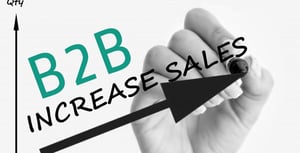 Every manufacturer's starting line with inbound marketing is unique. Some have 5,000+ visitors and 100 leads per month coming through their website, while others have less than 1,000 visitors and no real leads each month. Those two scenarios are much different and require focus in different areas of the inbound marketing methodology.
Every manufacturer's starting line with inbound marketing is unique. Some have 5,000+ visitors and 100 leads per month coming through their website, while others have less than 1,000 visitors and no real leads each month. Those two scenarios are much different and require focus in different areas of the inbound marketing methodology.
Inbound marketing is a marathon, not a sprint. You can't think of it with the same nimble mindset of a pay-per-click campaign. Generating great content that resonates with your buyer persona takes time, persistence, and analysis. When it starts working, you'll never look back! It's THE marketing strategy for developing a growing, predictable sales pipeline.
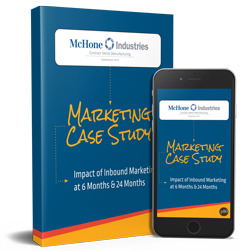
The Proof is in the Data
We specialize in working with manufacturers to turn their website into a lead generating machine. For some manufacturers, we support their marketing team. For others, we are their marketing team. Our goal is to steadily increase the number of quality sales conversations that our clients have, through online lead generation, lead nurturing, sales enablement, and inbound sales.
If you want to see what inbound marketing is capable of, check out the following case study:
Still have questions about Inbound Marketing for Manufacturers? We'd be happy to chat with you about how you can be successful with it. Book a brief time to chat below:





